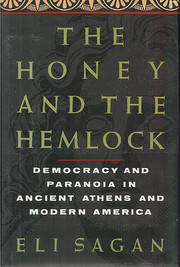

Click on a thumbnail to go to Google Books.
|
Loading... The Honey and the Hemlock: Democracy and Paranoia in Ancient Athens and Modern Americaby Eli Sagan
 None No current Talk conversations about this book. no reviews | add a review
"Democracy is a miracle," Eli Sagan writes, "considering human psychological disabilities." To shed light on this "miracle," Sagan focuses on the world's first democratic society, Athens, and mounts a compelling argument that Athens and the modern American republic, although separated by more than two thousand years, share the same fundamental moral and psychological dilemmas. Athens was a paradoxical society, Sagan maintains. Obedient to the rule of law, concerned with social justice, remarkably tolerant, it displayed an unprecedented psychological maturity. Yet at the same time it was an imperialist state, capable of genocidal action against other Greek states, that rested on the labor of thousands of slaves and treated women as political and social pariahs. The Honey and the Hemlock probes this profound mystery, exploring the intimate connection between political paranoia and a society's capacity--or incapacity--for democratic behavior. Sagan offers provocative observations, drawn from the Athenian and American experience, about the rule of elites, the political psychology of war and imperialism, the boundaries of social justice, and the roles of gain, honor, and wisdom as ruling political passions. A cautionary tale of ancient Greece and the ongoing struggle for democracy today, The Honey and the Hemlock is a fascinating account of the struggle between the rational and irrational in our public life. No library descriptions found. |
Current DiscussionsNone
 Google Books — Loading... Google Books — Loading...GenresMelvil Decimal System (DDC)321.8Social sciences Political science Systems of governments and states Democratic government [formerly : Republic]LC ClassificationRatingAverage: (2.75) (2.75)
Is this you?Become a LibraryThing Author. |
||||||||||||||||||||||||||||||||||||||||||||||||||||||||||||||||||||||||||||||||||||||||||||||||||||||||||||||||||||||||
One of the great insights of psychoanalytic theory, writes Sagan, is the developmental view that the psyche progresses in highly differentiated stages toward maturity and health. But, like Velikovsky’s thesis of planetary comets, shifting poles, and raining hydrocarbons, psychoanalysis is a pseudoscience, since there is no way to test it without relying on its own bogus assumptions.
From a wobbly platform of unfounded assumptions, then, Sagan takes a leap toward the nonsensical. He attributes to society a collective psyche, the ‘normal’ development of which ‘progresses’ through various stages. The purpose of History, Sagan claims, is to improve the mental health of society. Society is sick because it is paranoid. The term paranoia captures for Sagan all manner of social tensions and political malfunctions (here he dramatically misunderstands Hofstadter’s “paranoid style”). The process by which society overcomes 'neurosis' and 'psychopathology'—the bogey paranoia—is democratization (p. 65).
Sagan’s failure is threefold. First, in translating psychological concepts into sociology: there is no collective mind, ill or otherwise. Second, the teleological view of history, the belief that history has a purpose and a goal and so inevitably will arrive at a foregone conclusion, is a form of superstitious wish-fulfillment. Third, the idea that democracy is a cure for socio-psychological illness is buncombe.
If crackpottery is for you a form of entertainment, then you might enjoy The Honey and Hemlock. If you skip it, though, you will not have missed anything. (